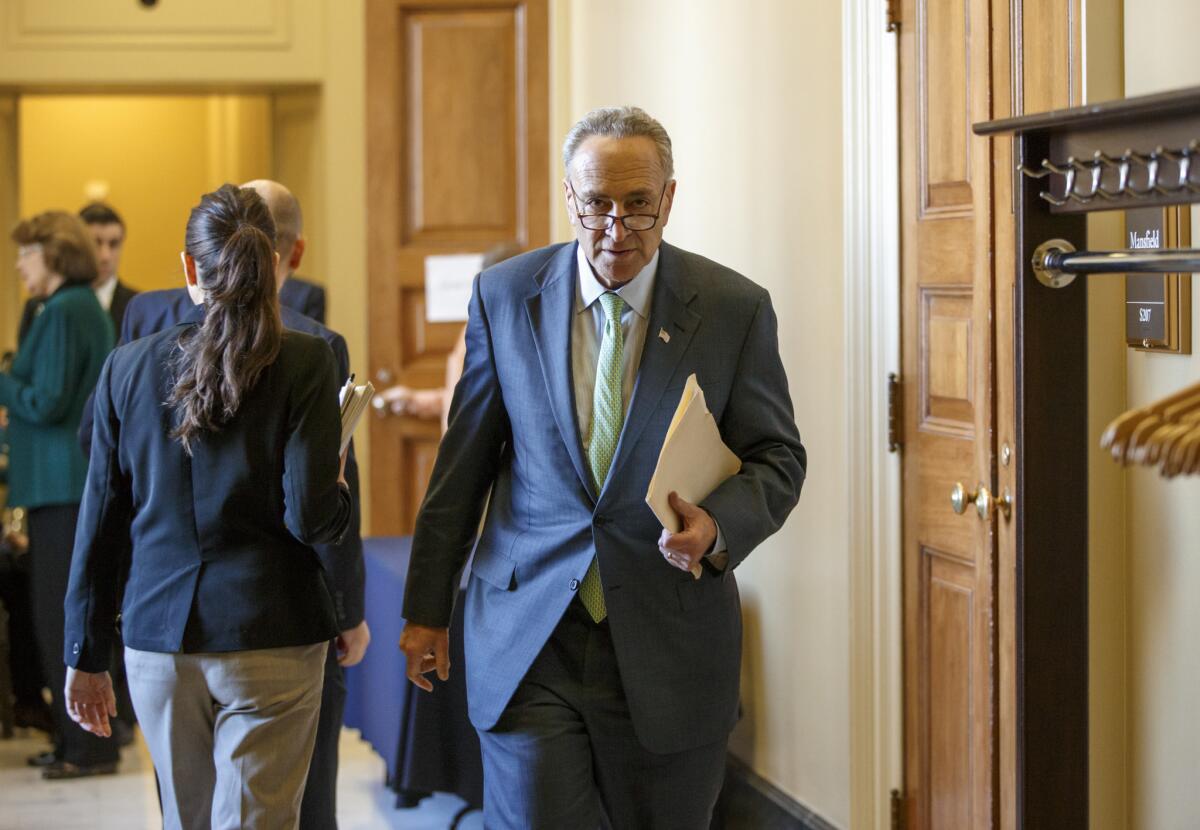Democratic campaign arm accused of trying to hinder progressive candidates in key Senate primaries

WASHINGTON — Progressive Senate candidates in at least two states are accusing a key Democratic Party campaign arm of actively working against them in primaries to help more moderate rivals favored by leadership as having a better shot of ousting GOP incumbents.
The efforts by the Democratic Senatorial Campaign Committee come as the party seeks to retake the Senate majority from Republicans in 2020. But while early intervention may help prevent ugly primary battles, it is already heightening internal tensions between the party’s centrists and progressives, and rekindling allegations of unfair meddling by party leadership.
Progressive candidates in Colorado and Maine — two of the most competitive 2020 Senate races — say political consultants and vendors have refused to work on their campaigns after being warned that doing so would risk a future boycott by the DSCC, which endorsed other Democrats for those primaries.
“They want to blackball us,” said Andrew Romanoff, a Democrat who is hoping to take on GOP Sen. Cory Gardner in Colorado in next year’s election. “We heard the same from enough firms. It’s not an accident.”
The DSCC threw its support behind former Colorado Gov. John Hickenlooper, a pro-fracking moderate, almost immediately after he announced his bid for the Senate seat late last month.
Romanoff, who backs “Medicare for all” and aggressively combating climate change, said at least five political vendors that had expressed interest in working with him later told his campaign that officials at the DSCC, which helps recruit and finance Democratic candidates, said the vendors would get no other business from the committee if they worked for Romanoff’s campaign.
A political consultant at one of those firms confirmed the account but refused to be named for fear of retribution, saying that the firm was told by an intermediary for Senate Minority Leader Charles E. Schumer (D-N.Y.) that “under no circumstances were we to work with Andrew Romanoff.” If it did, the firm would get no more DSCC-related business, including lucrative referrals to work on other campaigns or to put together outside political advertisements. Romanoff’s account was first published Thursday by the Intercept, a left-leaning online publication. Since then, Romanoff said he’s received offers from several firms offering to help his campaign, including one that he said wants to “get banned by Schumer.”
Schumer’s office referred questions to the DSCC.
DSCC spokeswoman Lauren Passalacqua said the committee has no policy that forbids vendors from working with Democratic candidates that it does not support.
But she added: “In our role as a campaign committee focused on winning Senate seats, we have ongoing conversations with strategists and advisors about battleground races.”
Maine Senate hopeful Betsy Sweet said she’s had similar trouble hiring finance staffers for her primary campaign. And Iowa Senate primary candidate Eddie Mauro said one vendor indicated that Washington Democrats “put pressure on them not to work with people like me” although he did not name the DSCC.
As in Colorado, the DSCC has endorsed more moderate Democrats in Maine and Iowa who they hope will beat sitting Republican senators in November 2020.
Vendors initially “are saying they’re excited [to work with the campaign,] and then they say they can’t do it,” Sweet said. “If you’re part of the political industrial complex and you’re making a career out of it, whether it is implicit or explicit, you don’t want to go up against that machine.”
The DSCC has endorsed Sara Gideon to take on GOP Sen. Susan Collins in Maine.
The intervention does not appear to be nationwide. Senate candidates in other races around the country said in interviews that they have seen no such interference in their campaign hiring.
But Sweet likened the DSCC’s meddling in her campaign to efforts made behind the scenes by the Democratic National Committee to bolster Hillary Clinton for president over Bernie Sanders in the 2016 primaries, moves that bitterly split the party.
“We in Maine have done a lot of work to reunify [since then]. This has just made it really hard,” she said. “It adds to the cynicism of people getting involved in politics.”
The DSCC’s counterpart for the House, the Democratic Congressional Campaign Committee, adopted a new written policy on vendors this year. The committee forbids vendors from getting DCCC business if they work on a primary challenge to a sitting Democratic House member. In that situation, the DCCC is trying to avoid Democrats trying to kick a sitting Democrat out of office.
For Democrats, the stakes in the Senate couldn’t be higher. Both Democrats and Republicans admit there is a window for Democrats to take control of the chamber by flipping Republican-held seats in Colorado, Arizona and Maine. They’re hoping additional challengers in Iowa and North Carolina take off. And their chances became a little more positive last week when a Georgia seat came into play upon the sudden retirement of Sen. Johnny Isakson.
Democrats need to win three or four seats to take control of the Senate in the 2020 election. (The figure depends on which party controls the White House and with it, the ability to break a 50-50 tie in the Senate.)
So far this year, the DSCC has endorsed candidates in Democratic primaries in nearly all of the marquee Senate races. Dan Sena, a Democratic operative who ran the House’s DCCC in the last cycle, said early endorsements can help donors and political supporters prioritize which candidates to back and which races look promising.
“If we’re going to stop Mitch McConnell from gutting access to affordable health care, confirming partisan judges to lifetime appointments on the federal bench and Supreme Court, and attacking reproductive rights, then we need to win Senate seats,” Passalacqua said. “We’re working with candidates who will do exactly that and help Democrats take back the Senate.”
Many of the Democratic candidates, even those who said the DSCC is not interfering with their hiring process, said they resented the committee’s endorsement in their race instead of letting a primary play out among voters.
That anger is most acute in Colorado, where a competitive Democratic primary between a dozen candidates was well underway when Hickenlooper dropped out of the presidential primary contest and announced he would run for the Senate.
The DSCC’s quick endorsement incensed candidates who were already in the race, an anger undoubtedly fueled by Hickenlooper’s prior comments that he didn’t want the Senate seat and wouldn’t be good at the job. Several of the self-identified liberal Democrats in the race say Hickenlooper — who opposes progressive standard-bearers such as Medicare for all and the Green New Deal — is too centrist for Colorado. They argue that Gardner is so vulnerable that almost any Democratic candidate can beat him.
“It’s hard for me to get in their head on this because a blue rock beats Cory Gardner by 10%,” said Alice Madden, one of the Democratic hopefuls.
Madden and the five other Democratic women in the race signed a letter last week asking the DSCC to reconsider the endorsement, arguing that it implies “that we should defer to a male candidate because you seem to believe he is ‘more electable.’”
Schumer had long made no secret that he wanted Hickenlooper, who has tremendous name recognition in the state, to take on Gardner next year. Democratic strategists say polling shows that Hickenlooper’s popularity would survive intense negative messaging, making him the strongest candidate in both the primary and general election.
On Tuesday, 314 Action, a group that promotes electing Democrats with scientific backgrounds, touted a poll that showed 72% of Democratic primary voters have a favorable opinion of Hickenlooper — a former geologist — besting all other Democrats by more than 30 percentage points.
For his part, Hickenlooper “believes anyone should be able to work for anyone they want to,” according to his spokesperson, Jacque Montgomery. “And anyone who wants to throw their hat in the ring should step up and run for office.”
More to Read
Get the L.A. Times Politics newsletter
Deeply reported insights into legislation, politics and policy from Sacramento, Washington and beyond. In your inbox three times per week.
You may occasionally receive promotional content from the Los Angeles Times.











